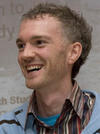Dr Elton Barker

Fachbereich Geschichts- und Kulturwissenschaften
Friedrich-Meinecke-Institut
Historische Geographie des antiken Mittelmeerraumes
Since 2012 visiting fellow (Alexander-von-Humboldt-Stipendiat)
14195 Berlin
- folgt in Kürze -
Elton’s research interests include: the agõn in ancient Greek literature and thought; Greek epic rivalry and reception; ancient geographies; and digital Classics. His book, Entering the Agon (Oxford University Press, 2009), investigates representations of debate in epic, historiography and tragedy in terms of an interpretative framework of dissent from authority. As well as publishing widely on epic, historiography and tragedy, he has articles on the new Archilochus fragment, oracles in Herodotus and the reception of the Epic Cycle.
In the field of digital Classics Elton has been pioneering work as Principal Investigator of three collaborative projects. With an Arts and Humanities Research Council Early Career Fellowship (2008-2010) he developed the Hestia project, which, involving collaboration between researchers from Classics, Geography and Computing, uses the latest digital mapping tools to investigate Herodotus’s representation of the ancient world. From October 2010 he has been running the Google Ancient Places (GAP) project, which, funded by a Digital Humanities Research Grant from Google, aims to discover ancient places in the Google Books corpus. From February 2011 he has been Principal Investigator of the Pelagios project, funded by JISC, which brings together an international consortium of ancient world projects in order to link online all kinds of data related to ancient places.
Beschreibung des Forschungsvorhaben
With his Research Fellowship for experienced researchers awarded by the Alexander von Humboldt Foundation, Elton will work closely with Prof. Dr. Klaus Geus of the Freie Universität Berlin and Prof. Dr. Gerhard Heyer of the University of Leipzig to extend the Hestia project’s investigation into cultural geographies of ancient Greek literature through the aid of digital methods of textual analysis. In particular, we hope to address the following concerns:
• What are the different ways in which spatial ideas are conceived of and represented in the ancient world?
• In what ways might texts offer ways of representing spatial ideas different from maps and other visual media?
• To what extent is network theory a useful model to think with when dealing with geographical concepts in texts?
• How might Information Computing Technology be used to analyse spatial data of this kind, and what are its limitations?
• More broadly, what potential collaborations can be pursued between classical scholars (or humanities researchers generally) and computer scientists, and how?
- folgt in Kürze -
